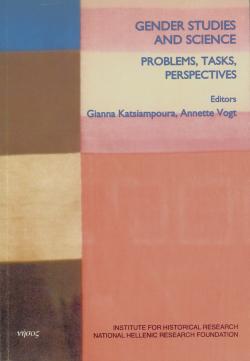| Abstract | The research on the topics “women and science” and “gender and science” covers a range of fields, such as history, sociology, philosophy, psychology, mathematics, natural sciences, technology, medicine, etc. Through these different approaches and different methods, research on gender studies is updated and opens in turn further research fields. However, studies on the issue of gender determinations in the field of natural sciences are scarce. The field of natural sciences, with respect to both research and teaching, has attracted so far little interest in Greece - and elsewhere. Nonetheless, as one of the most gendered determined spaces, it continues to be one of the most privileged areas for the study of gender differences.
Taking the above into consideration, nowadays it is possible to formulate a series of questions and seek pathways for research. The first question concerns the methodology in relation to the history of science. The history of science has much to offer in the interpretation of the relationship between gender and science, given that this interpretation is a crucial point in reforming existing patterns (both in terms of gender and science itself, i.e. its epistemological and methodological frameworks). The exposure and study of gender discriminations in this field aims not merely at a wider “feminine” participation but the renegotiation of the nature of science itself and its institutional forms. An open question is how the methodologies of the two fields, gender studies and the history of science, could affect each other, leading to more pluralistic studies.
A second issue is the study and reexamination of the sources in the light of the exposure of gender differences. This study, apart from bringing the “invisible” women to light, may also expose the causes and mechanisms that rendered them invisible (gender, class, race, etc.).
The volume “Gender Studies and Science: Problems, Tasks, Perspectives”, edited by Annette Vogt, from the Max Planck Institute in Berlin, and Gianna Katsiampoura from the History, Philosophy and Didactics of Science and Technology Programme of Institute for Historical Research/NHRF, aims precisely at highlighting the relationship between gender and science, through the theoretical concerns expressed in recent years. The contributions that make up the volume approach the issue in question from different perspectives, so as the total project provides the broadest possible oversight of contemporary concerns. After a brief “Introduction” by Gianna Katsiampoura and Annette Vogt, follow the contributions by Anna Chronaki, “Disrupting ‘Development’ as the Quality / Equity Discourse: Cyborgs and Subalterns in School Technoscience”, Anne-Sophie Godfroy, “Why usual assumptions should be questioned”, Gianna Katsiampoura, “Gender, Ecology and History of Science”, Maria Rentetzi, “Gender, Science and Politics: Queen Frederika and Nuclear Research in Post-war Greece”, Martina Schlunder, “Femaleness as regular pathology? Menstrual calendars as instruments for regulating the irregularities of ‘female nature’”, Tzveta Sofronieva, “The Radium Institute, the Cavendish Laboratory and the emergence of atomic physics in Bulgaria”, Olga Valkova, “The Conquest of Science: Women and Science in Russia , 1860-1940”, Annette Vogt, “From Sofia Kovalevskaja to Dorothy Hodgkin - Women in Science in Europe”.
|



